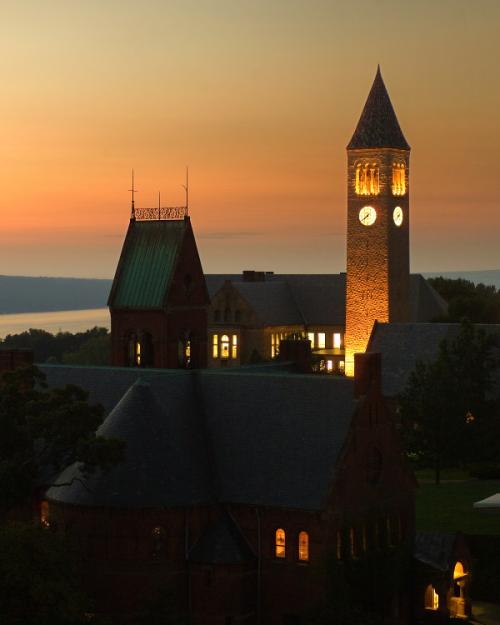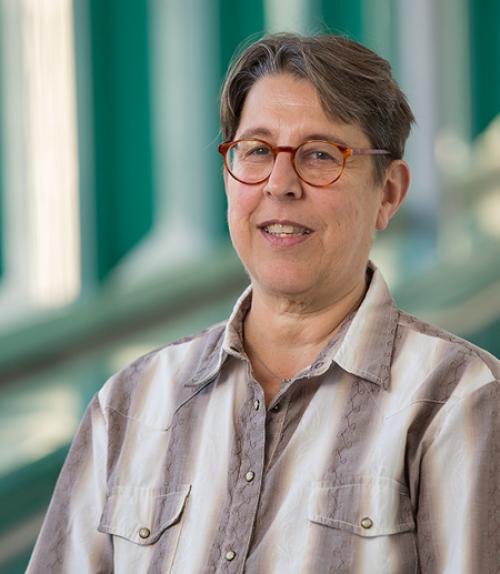Professor Amy Villarejo, who led the Department of Performing and Media Arts as chair for seven years, has been named the first faculty director for the Milstein Program in Technology and Humanity.
The program, launched last month with a $20 million gift from the Milstein Family Foundation, led by Howard P. Milstein ’73, Abby S. Milstein, and Michael M. Milstein ‘11, is a collaboration between the College of Arts and Sciences and Cornell Tech, and the first undergraduate link between the Ithaca and Roosevelt Island campuses. It will offer a unique multidisciplinary curriculum to a cohort of 100 students, beginning with 25 students in the Class of 2022.
“Undergraduate education has always been a synthesis of disciplinary perspectives and the coming together of different ways of thinking and doing,” Villarejo said. “The Milstein Program is about the core values of a liberal arts and sciences education combined with a specialized tech curriculum. I am excited about selecting this remarkable cohort and the potential to develop an inclusive and diverse group of students from the beginning.”
Along with Villarejo, two faculty fellows in Ithaca will be named to the program for three-year terms, as well as a faculty director at the Cornell Tech campus.
“We are so pleased that Amy Villarejo will be leading the Milstein Program through its inaugural phase,” said Gretchen Ritter ’83, the Harold Tanner Dean of Arts and Sciences. “As a scholar, a teacher and an experienced leader, her work has spanned the liberal arts in exciting and innovative ways. I look forward to seeing this program flourish under her leadership.”
Villarejo came to Cornell in 1997 and was formerly director of the Feminist, Gender and Sexuality Studies program. She chaired the Department of Performing and Media Arts 2008-15, leading the department through two major restructurings and reorganizations, including an effort in 2012 that resulted in a new major and a name change.
She has published widely in cinema and media studies, with research on feminist and queer media, documentary film, Brazilian cinema, Indian cinema, American television, critical theory and cultural studies. Her first book, “Lesbian Rule: Cultural Criticism and the Value of Desire” (2003) won the Katherine Singer Kovacs award from the Society for Cinema and Media Studies. Villarejo was torn between majoring in math or English as an undergraduate at Bryn Mawr.
Cinema and media studies, she said, includes a combination of social science methods of research, textual analysis drawn from the humanities and an understanding of the industrial and technical basis of a medium.
“From understanding the chemical properties of silver halide crystals in early cinema to understanding CGI (computer-generated imagery) and motion capture and VR (virtual reality) and some of the technology emerging as we speak, it’s a field of study that has always had an interdisciplinary call,” she said.
Students in the Milstein Program will have access to a specialized curriculum that will develop their proficiency in computer science during the school year in Ithaca, and spend two summers together at Cornell Tech immersed in the innovation economy. The program combines skills needed for today’s tech economy with the cultures and disciplines of the humanities and social sciences.
Villarejo will help create new introductory and capstone courses for Milstein Program students. She said the program will take advantage of emerging fields, such as computational social science. It will draw on new university projects – including the Critical Inquiry into Values, Imagination and Culture (CIVIC), which forged two initiatives: Media Studies, Material Cultures and the Senses; and Humanities, Arts and Public Life – and will include such innovations as honors seminars and courses that prioritize hands-on “thinking through doing.”
She also has a vision of creating an engaged learning piece of the program to connect Milstein students with high schoolers. “I want to think about how this cohort might start to give back early on in developing an interest in technology and big questions among younger folks,” Villarejo said.
Villarejo said the Milstein Program will affect more than the 100 students in the cohort: “Its tentacles will make their way not just into the humanities, but into thinking about science and technology in relation to other questions of values and ethics and images and design, all of which are fundamental questions about the relationship between the digital environment and our collective future.”
This story also appeared in the Cornell Chronicle.




